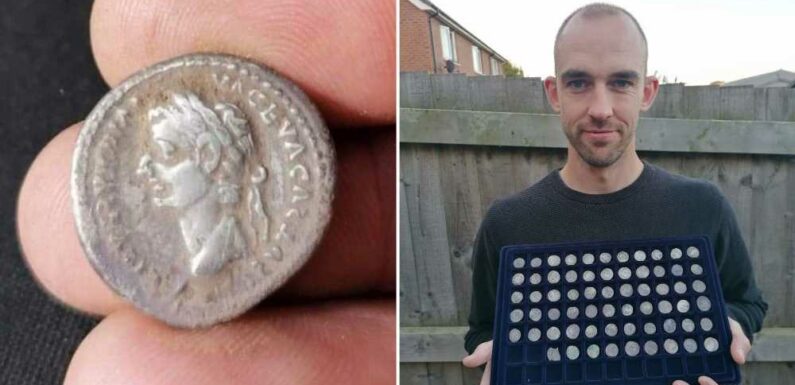
A LUCKY metal detectorist who discovered hundreds of Roman coins worth thousands is set to buy a house.
Darren Booth was thrilled when he found a single Roman coin in a freshly ploughed field – but what he found next shocked him.
The silver denarii artefact was only the tip of the iceberg as he went on to uncover 337 of them.
Individual Roman denarii coins sell for about £200 which would make the hoard potentially worth over £60,000.
Darren, from Flintshire, North Wales, will split the proceeds with the landowner but will use his share to put down a deposit for a house for him and wife Laura and their two children.
The engineer said: "The first coin was my first ever Roman coin. I stared at it in awe. It turned out to be a Tiberius Roman coin struck in around 16AD.
Read More
I haven’t turned on heating thanks to home office trick – it saves me £40 a week
History buff discovers Roman coins worth £200k in farmer’s field
"I filled in the hole where there was another one. I thought I had dropped the first one to begin with.
"My detector was just bleeping all over the place and then I found the third and I called the organiser over to cordon the area off.
"Me and the chairman found 64 coins in about two hours. It was mind-blowing.
"I was very excited to start with but then became very nervous because I was aware we were dealing with something so historic and so rare.
Most read in Money
Brits set to get £325 cash boost in supermarket vouchers – can you claim?
Major supermarket cuts price of turkey to just £5 from £50 in sale
M&S slashes price of snow globe gin in Boxing Day sales
Asda shoppers rush to buy bargain air fryer that’s £100 cheaper than a Ninja
"They were all scattered so we thought there was a chance the plough had struck a hoard and scattered these coins."
He located them in a 10sq metre area and the site was then cordoned off while a team of detectorists joined the search.
The 40-year-old's metal detector went on to pick up signals from a collected of 273 coins buried just 1ft underground.
The coins feature the heads of five Roman Emperors – Vespasian, Vitellius, Galba, Tiberius and Augustus – and date from 209BC to 70AD.
The Vespasian coin is only the second one ever to have been found in the UK.
It is thought they would have belonged to a Roman soldier who buried the money for safekeeping while he went off to fight in a campaign but never returned.
"It was me who found it in one hole. There were loads of coins stacked on their edges," Darren added.
"It was obvious they must have been kept in something but there were no signs of pottery or fabric like leather or hessien," Darren continued.
"We think the coins were the pay of a legionary soldier. Maybe he buried it there, went out to fight in some campaign and never made it back.
"If it was a soldier's pay it would have been about 12 months worth of wages.
"Or there was an Iron Age fort in the area and another theory is that maybe the coins were on offer in order to befriend them."
The find was made in Gobowen, in the Shropshire Marches, named after the fact that Roman soldiers used to march back and forth from Shrewsbury to Chester.
At present the coin collection is with the British Museum -which has deemed it so important that it is buying it.
The lucky metal detectorist, a member of the Mold Historic Search Society, said: "It is remarkable to think that I was the first person to touch these coins in 2,000 years. You don't get that kind of feeling with any other hobby."
Julian Evan-Hart, editor of Treasure Hunting magazine, said: "I was delighted to hear of Darren's discovery which has now been named the 'Gobowen Hoard'.
"One can but ponder on the conditions under which this deposit was made and that is part of the thrill associated with all such metal detecting finds.
"Being composed of earlier issue coinage the purity level of the silver involved is somewhat higher than many later hoards.
Read More on The Sun
Shoppers rave about Asda’s Christmas sale – including a 3p denim shirt
Urgent WhatsApp danger you must avoid – or it could cost you thousands
"Issues of Galba and Vitellius are particularly prized as finds by detectorists due to their general scarcity and are therefore also highly collectable.
"Yet again another important contribution has been made to our understanding of British numismatics by a metal detectorist."
Source: Read Full Article












